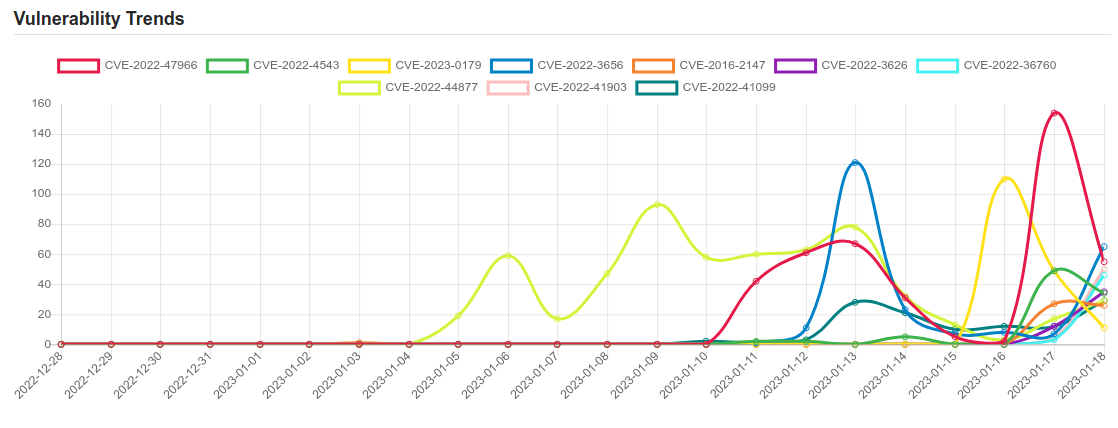Daily Vulnerability Trends: Thu Jan 19 2023

| CVE NAME | CVE Description |
| CVE-2021-31985 | Microsoft Defender Remote Code Execution Vulnerability |
| CVE-2023-21674 | Windows Advanced Local Procedure Call (ALPC) Elevation of Privilege Vulnerability. |
| CVE-2022-21881 | Windows Kernel Elevation of Privilege Vulnerability. This CVE ID is unique from CVE-2022-21879. |
| CVE-2023-0321 | No description provided |
| CVE-2022-46169 | Cacti is an open source platform which provides a robust and extensible operational monitoring and fault management framework for users. In affected versions a command injection vulnerability allows an unauthenticated user to execute arbitrary code on a server running Cacti, if a specific data source was selected for any monitored device. The vulnerability resides in the `remote_agent.php` file. This file can be accessed without authentication. This function retrieves the IP address of the client via `get_client_addr` and resolves this IP address to the corresponding hostname via `gethostbyaddr`. After this, it is verified that an entry within the `poller` table exists, where the hostname corresponds to the resolved hostname. If such an entry was found, the function returns `true` and the client is authorized. This authorization can be bypassed due to the implementation of the `get_client_addr` function. The function is defined in the file `lib/functions.php` and checks serval `$_SERVER` variables to determine the IP address of the client. The variables beginning with `HTTP_` can be arbitrarily set by an attacker. Since there is a default entry in the `poller` table with the hostname of the server running Cacti, an attacker can bypass the authentication e.g. by providing the header `Forwarded-For: |
| CVE-2022-42475 | A heap-based buffer overflow vulnerability [CWE-122] in FortiOS SSL-VPN 7.2.0 through 7.2.2, 7.0.0 through 7.0.8, 6.4.0 through 6.4.10, 6.2.0 through 6.2.11, 6.0.15 and earlier and FortiProxy SSL-VPN 7.2.0 through 7.2.1, 7.0.7 and earlier may allow a remote unauthenticated attacker to execute arbitrary code or commands via specifically crafted requests. |
| CVE-2023-22809 | In Sudo before 1.9.12p2, the sudoedit (aka -e) feature mishandles extra arguments passed in the user-provided environment variables (SUDO_EDITOR, VISUAL, and EDITOR), allowing a local attacker to append arbitrary entries to the list of files to process. This can lead to privilege escalation. Affected versions are 1.8.0 through 1.9.12.p1. The problem exists because a user-specified editor may contain a “–” argument that defeats a protection mechanism, e.g., an EDITOR=’vim — /path/to/extra/file’ value. |
| CVE-2023-21835 | Vulnerability in the Oracle Java SE, Oracle GraalVM Enterprise Edition product of Oracle Java SE (component: JSSE). Supported versions that are affected are Oracle Java SE: 11.0.17, 17.0.5, 19.0.1; Oracle GraalVM Enterprise Edition: 20.3.8, 21.3.4 and 22.3.0. Easily exploitable vulnerability allows unauthenticated attacker with network access via DTLS to compromise Oracle Java SE, Oracle GraalVM Enterprise Edition. Successful attacks of this vulnerability can result in unauthorized ability to cause a partial denial of service (partial DOS) of Oracle Java SE, Oracle GraalVM Enterprise Edition. Note: This vulnerability applies to Java deployments, typically in clients running sandboxed Java Web Start applications or sandboxed Java applets, that load and run untrusted code (e.g., code that comes from the internet) and rely on the Java sandbox for security. This vulnerability does not apply to Java deployments, typically in servers, that load and run only trusted code (e.g., code installed by an administrator). CVSS 3.1 Base Score 5.3 (Availability impacts). CVSS Vector: (CVSS:3.1/AV:N/AC:L/PR:N/UI:N/S:U/C:N/I:N/A:L). |
| CVE-2022-4543 | A flaw named “EntryBleed” was found in the Linux Kernel Page Table Isolation (KPTI). This issue could allow a local attacker to leak KASLR base via prefetch side-channels based on TLB timing for Intel systems. |
| CVE-2023-0179 | No description provided |
| CVE-2022-3656 | Insufficient data validation in File System in Google Chrome prior to 107.0.5304.62 allowed a remote attacker to bypass file system restrictions via a crafted HTML page. (Chromium security severity: Medium) |
| CVE-2016-2147 | Integer overflow in the DHCP client (udhcpc) in BusyBox before 1.25.0 allows remote attackers to cause a denial of service (crash) via a malformed RFC1035-encoded domain name, which triggers an out-of-bounds heap write. |
| CVE-2022-3626 | LibTIFF 4.4.0 has an out-of-bounds write in _TIFFmemset in libtiff/tif_unix.c:340 when called from processCropSelections, tools/tiffcrop.c:7619, allowing attackers to cause a denial-of-service via a crafted tiff file. For users that compile libtiff from sources, the fix is available with commit 236b7191. |
| CVE-2022-36760 | Inconsistent Interpretation of HTTP Requests (‘HTTP Request Smuggling’) vulnerability in mod_proxy_ajp of Apache HTTP Server allows an attacker to smuggle requests to the AJP server it forwards requests to. This issue affects Apache HTTP Server Apache HTTP Server 2.4 version 2.4.54 and prior versions. |
| CVE-2022-44877 | login/index.php in CWP (aka Control Web Panel or CentOS Web Panel) 7 before 0.9.8.1147 allows remote attackers to execute arbitrary OS commands via shell metacharacters in the login parameter. |
A considerable amount of time and effort goes into maintaining this website, creating backend automation and creating new features and content for you to make actionable intelligence decisions. Everyone that supports the site helps enable new functionality.
If you like the site, please support us on Patreon using the button below

To keep up to date follow us on the below channels.







